When it comes to compact SUVs, two models that have been generating significant buzz are the CUPRA Formentor and the Toyota C-HR. With a combination of performance, innovative technology, and striking designs, both vehicles present unique options for drivers looking to enhance their driving experience. This article will delve into a detailed comparison of these two distinct models, covering technical specifications, innovations, and what sets them apart on the road.
CUPRA Formentor vs Toyota C-HR - Differences and prices compared
Compare performance (390 HP vs 223 HP), boot space and price (35200 £ vs 29100 £ ) at a glance. Find out which car is the better choice for you – CUPRA Formentor or Toyota C-HR?
Engine Options and Performance
The CUPRA Formentor offers a robust lineup of engine options that cater to different driving preferences. It features petrol, plug-in hybrid, petrol MHEV, and diesel engines, ranging from a spirited 150 HP to a blistering 333 HP in its high-performance variant. The Formentor promises impressive acceleration, with its quickest variant achieving 0-100 km/h in just 4.8 seconds. Additionally, with an array of drivetrain options, including both front-wheel and all-wheel drive, drivers can choose what best suits their lifestyle.
In contrast, the Toyota C-HR leans heavily on hybrid technology, offering full hybrid and plug-in hybrid options. The most powerful variant produces 223 HP, yet its acceleration is a slightly leisurely 7.4 seconds for 0-100 km/h. The C-HR focuses on efficiency with its impressive fuel consumption, clocking in at as low as 4.7 L/100 km, making it an excellent choice for eco-conscious consumers.
Fuel Efficiency and Environmental Impact
If fuel efficiency is a priority, the C-HR excels with its hybrid drivetrain, achieving a remarkable average consumption of around 4.7 L/100 km. The electric range of the C-HR also stands at 67 km, allowing short errands to be completed without consuming any petrol. The low CO2 emissions of just 105 g/km and a CO2 efficiency class rating of B underscore Toyota's commitment to reducing environmental impact.
The CUPRA Formentor, while not as focused on ultra-low emissions as the C-HR, still provides compelling options for hybrid enthusiasts. With a plugin hybrid variant offering an electric range of up to 125 km and a CO2 efficiency class ranging from E to B, it balances performance and environmental considerations effectively.
Interior Comfort and Technology
Both vehicles are designed with the driver's comfort in mind, but they approach the concept differently. The CUPRA Formentor boasts a sleek, sporty interior with premium materials and standout features like a digital cockpit, a large touchscreen infotainment system, and advanced connectivity options. With ample trunk space of up to 420 liters, it also offers practicality alongside its sporty persona.
The Toyota C-HR, on the other hand, emphasizes a user-friendly experience. Its interior is characterized by an ergonomic layout and high-quality materials, making it a comfortable choice for family-oriented drivers. The Toyota model features a larger trunk capacity at 447 liters and an intuitive infotainment system supporting various smartphone integrations, perfect for tech-savvy users.
Driving Experience and Handling
The CUPRA Formentor’s performance-oriented architecture translates into a dynamic driving experience. Its sharp handling, sporty suspension setup, and available all-wheel-drive system make it a thrill to drive on winding roads or highways. The driving modes available also allow the driver to tailor the vehicle’s responses to their preferences.
Conversely, the Toyota C-HR is tuned for a more comfortable ride, favoring stability and responsiveness over outright sportiness. The hybrid system provides a smooth driving experience, especially in urban settings, where it silently glides thanks to its electric motor. This makes the C-HR a fantastic choice for city dwellers.
Conclusion: Which One is Right for You?
Ultimately, the choice between the CUPRA Formentor and the Toyota C-HR boils down to individual preferences. The Formentor is a perfect fit for those seeking performance, a sportier aesthetic, and multiple engine options, including high-powered variants. The availability of petrol and diesel options can also cater to a wider audience.
On the other hand, the C-HR stands out as an exceptional hybrid option that prioritizes fuel efficiency, environmental impact, and ease of use. With its smart interior and practical features, it attracts drivers looking for a reliable, eco-friendly compact SUV. Whichever you choose, both models have a lot to offer in the competitive SUV segment.
Here’s where it gets real: The technical differences in detail
Costs and Efficiency:
When it comes to price and running costs, the biggest differences usually appear. This is often where you see which car fits your budget better in the long run.
Toyota C-HR has a noticeable advantage in terms of price – it starts at 29100 £ , while the CUPRA Formentor costs 35200 £ . That’s a price difference of around 6107 £.
Fuel consumption also shows a difference: CUPRA Formentor manages with 1.40 L and is therefore decisively more efficient than the Toyota C-HR with 2.30 L. The difference is about 0.90 L per 100 km.
As for electric range, the CUPRA Formentor performs significantly better – achieving up to 126 km, about 60 km more than the Toyota C-HR.
Engine and Performance:
Power, torque and acceleration are the classic benchmarks for car enthusiasts – and here, some clear differences start to show.
When it comes to engine power, the CUPRA Formentor has a convincingly edge – offering 390 HP compared to 223 HP. That’s roughly 167 HP more horsepower.
In acceleration from 0 to 100 km/h, the CUPRA Formentor is convincingly quicker – completing the sprint in 4.20 s, while the Toyota C-HR takes 7.40 s. That’s about 3.20 s faster.
Space and Everyday Use:
Cabin size, boot volume and payload all play a role in everyday practicality. Here, comfort and flexibility make the difference.
Both vehicles offer seating for 5 people.
In curb weight, CUPRA Formentor is barely noticeable lighter – 1434 kg compared to 1505 kg. The difference is around 71 kg.
In terms of boot space, the CUPRA Formentor offers minimal more room – 450 L compared to 447 L. That’s a difference of about 3 L.
When it comes to payload, CUPRA Formentor a bit takes the win – 526 kg compared to 425 kg. That’s a difference of about 101 kg.
Who wins the race in the data check?
The CUPRA Formentor sits well ahead of its rival in the objective data comparison.
This result only shows which model scores more points on paper – not which of the two cars feels right for you.
Costs and Consumption
View detailed analysis
Engine and Performance
View detailed analysis
Dimensions and Body
View detailed analysis
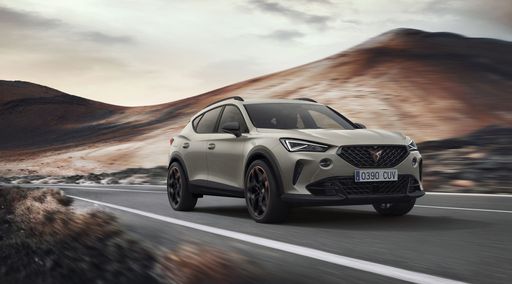
CUPRA Formentor
CUPRA Formentor
With coupe-like lines and a muscular stance the Cupra Formentor blends sporty drama with everyday sense, so it looks like it’s in motion even at a standstill. Inside and out it’s tuned for drivers who want engaging handling and a grown-up cabin — practical enough for daily life, playful enough to make the commute feel like a short track session.
details
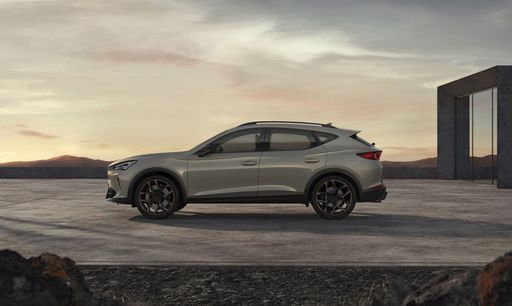
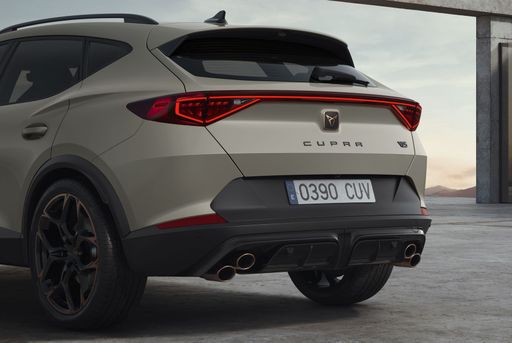
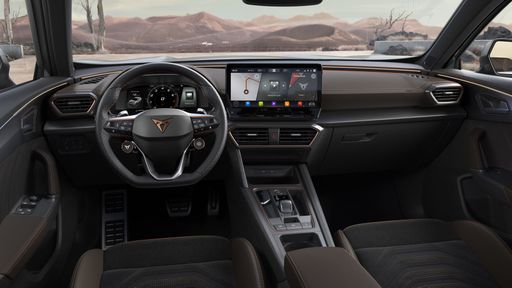
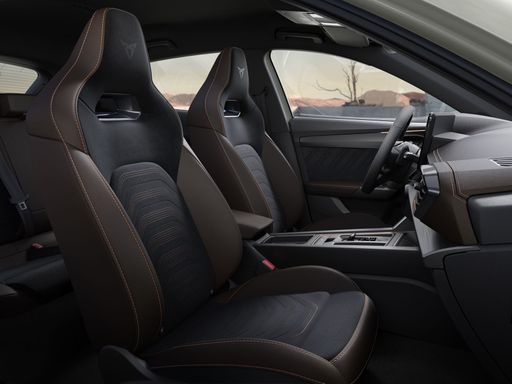
Toyota C-HR
The Toyota C-HR cuts a striking figure with its angular styling and coupe-like profile, so you’ll never go unnoticed in the supermarket car park. It balances everyday practicality with a nimble, city-friendly personality, making routine commutes feel a touch more fun without asking for forgiveness.
details




Costs and Consumption |
|
|---|---|
|
Price
35200 - 62500 £
|
Price
29100 - 42800 £
|
|
Consumption L/100km
1.4 - 10.1 L
|
Consumption L/100km
2.3 - 5.1 L
|
|
Consumption kWh/100km
-
|
Consumption kWh/100km
-
|
|
Electric Range
117 - 126 km
|
Electric Range
66 km
|
|
Battery Capacity
19.70 kWh
|
Battery Capacity
-
|
|
co2
32 - 229 g/km
|
co2
52 - 116 g/km
|
|
Fuel tank capacity
40 - 55 L
|
Fuel tank capacity
-
|
Dimensions and Body |
|
|---|---|
|
Body Type
SUV
|
Body Type
SUV
|
|
Seats
5
|
Seats
5
|
|
Doors
5
|
Doors
-
|
|
Curb weight
1434 - 1742 kg
|
Curb weight
1505 - 1755 kg
|
|
Trunk capacity
345 - 450 L
|
Trunk capacity
350 - 447 L
|
|
Length
4451 mm
|
Length
-
|
|
Width
1839 - 1852 mm
|
Width
1832 mm
|
|
Height
1511 - 1537 mm
|
Height
-
|
|
Max trunk capacity
1415 - 1505 L
|
Max trunk capacity
-
|
|
Payload
439 - 526 kg
|
Payload
375 - 425 kg
|
Engine and Performance |
|
|---|---|
|
Engine Type
Petrol, Petrol MHEV, Diesel, Plugin Hybrid
|
Engine Type
Full Hybrid, Plugin Hybrid
|
|
Transmission
Automatic, Manuel
|
Transmission
Automatic
|
|
Transmission Detail
Dual-Clutch Automatic, Manual Gearbox
|
Transmission Detail
CVT
|
|
Drive Type
All-Wheel Drive, Front-Wheel Drive
|
Drive Type
Front-Wheel Drive, All-Wheel Drive
|
|
Power HP
150 - 390 HP
|
Power HP
140 - 223 HP
|
|
Acceleration 0-100km/h
4.2 - 9 s
|
Acceleration 0-100km/h
7.4 - 9.9 s
|
|
Max Speed
210 - 250 km/h
|
Max Speed
-
|
|
Torque
250 - 480 Nm
|
Torque
-
|
|
Number of Cylinders
4 - 5
|
Number of Cylinders
4
|
|
Power kW
110 - 287 kW
|
Power kW
103 - 164 kW
|
|
Engine capacity
1498 - 2480 cm3
|
Engine capacity
1798 - 1987 cm3
|
General |
|
|---|---|
|
Model Year
2024 - 2026
|
Model Year
2026
|
|
CO2 Efficiency Class
G, E, D, F, B
|
CO2 Efficiency Class
C, D, B
|
|
Brand
CUPRA
|
Brand
Toyota
|
What drive types are available for the CUPRA Formentor?
Available configurations include All-Wheel Drive or Front-Wheel Drive.
